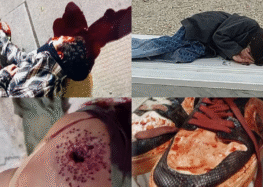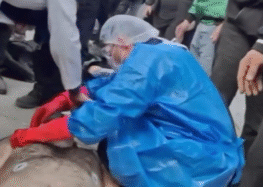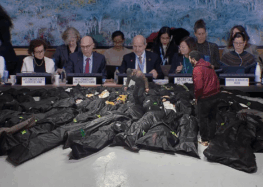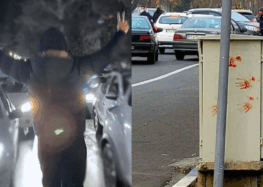Firsthand Account from Evin Prisoners: Trapped Between Israel’s Unlawful Attacks and Iranian Authorities’ Shocking Abuses
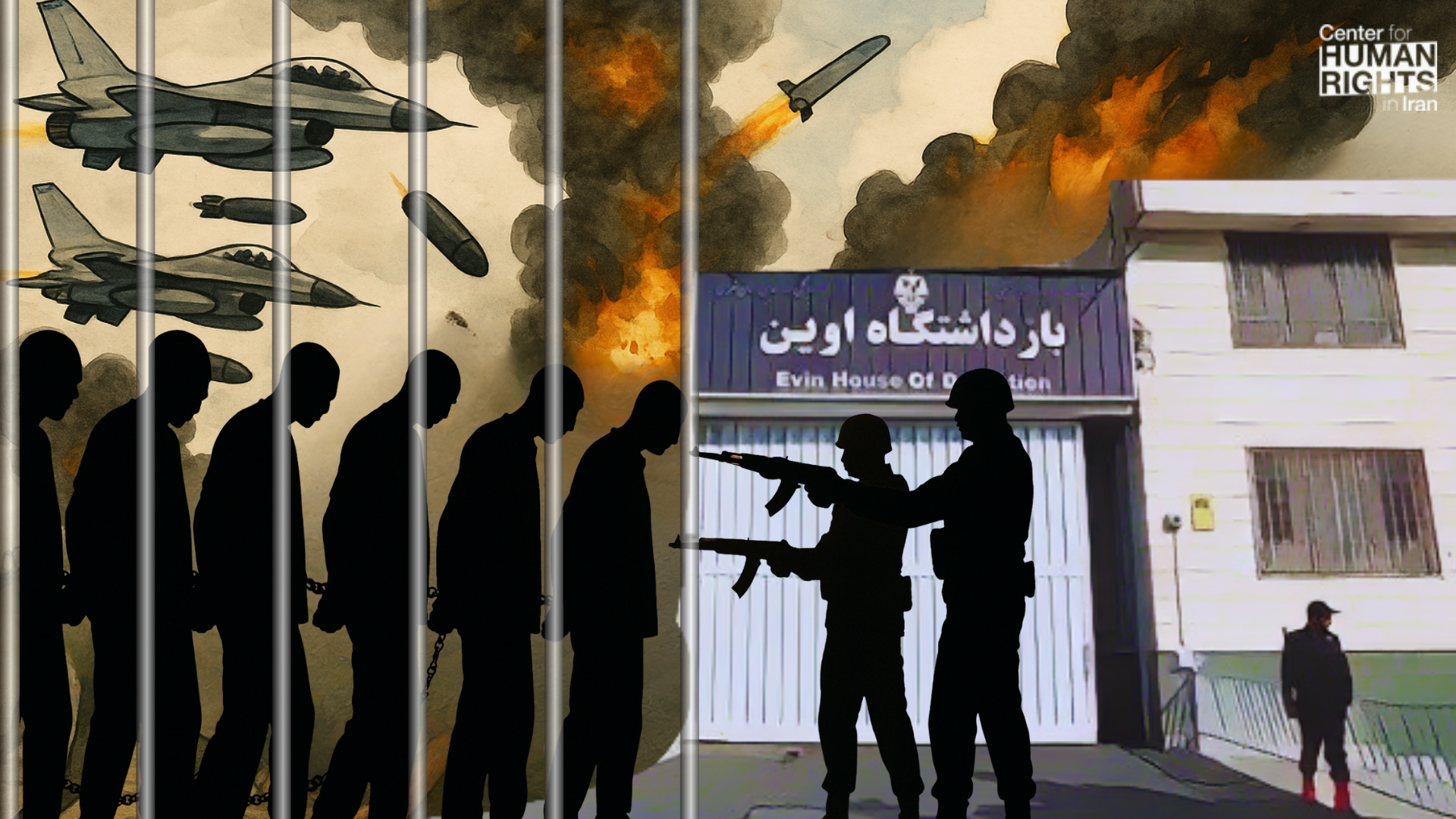
Prisoners Threatened at Gunpoint, Violently Transferred, Denied Life-Saving Supplies
July 7, 2025 — In a harrowing firsthand account, prominent Iranian political prisoners Abolfazl Qadyani and Mehdi Mahmoudian expose the deliberate endangerment and brutal treatment of inmates during and after the June 2025 military strikes on Iran’s Evin Prison by Israel. Their letter, written from inside Tehran’s notorious prison system, reveals the devastation wrought by Israel’s attack on Evin Prison, which was a severe violation of international law and the rules of war, as well as the shocking inhumanity and illegality of the Islamic Republic’s response.
Despite repeated warnings from human rights advocates and the prisoners themselves, Iranian authorities failed to take even the most basic steps to safeguard those in their custody, instead responding with increased violence and repression. When the prison was bombed by Israel, inmates were left to rescue the wounded themselves amid fire and rubble. In the aftermath, rather than receiving aid, they were subjected to threats at gunpoint, the forced, brutal transfer to even harsher conditions in Greater Tehran Prison, and the denial of food, water and essential medicines.
Key abuses outlined in the letter:
- Failure to Protect in Wartime: Despite repeated warnings from inmates and civil society actors, Iranian authorities failed to take any measures to protect prisoners during an active military conflict.
- Evin Prison Bombing and Aftermath: During Israeli airstrikes, Evin Prison was struck by multiple explosions. Parts of the facility, including the infirmary and storage areas, were destroyed. Dozens of deaths and injuries were reported, including among prison staff, guards, and visiting family members.
- Targeting of Inmates by Iranian Forces Post-Attack: In the immediate aftermath of the bombing, Islamic Revolutionary Guard Corps (IRGC) and Intelligence Ministry agents aimed weapons at prisoners who were assisting the wounded and attempting rescue efforts in the absence of adequate staff response, and forcibly returned them to damaged wards under threat.
- Denial of Basic Needs Post-Attack: Prisoners in damaged sections of Evin were left without access to water or electricity for extended periods.
- Forced and Dangerous Prisoner Transfer: Prisoners, including the elderly and those with serious medical conditions, were forcibly transferred to Greater Tehran Prison. They were shackled at the hands and feet and marched over rubble for hours in darkness, with rifles aimed at them. Many were denied food, water, or rest throughout the process.
- Confrontation Between Security Agencies: The letter describes a tense armed standoff between law enforcement and intelligence forces during the transfer, particularly regarding the treatment of Dr. Ahmadreza Jalali, a dual-nationality prisoner, who was eventually separated and taken to an undisclosed location.
- Overcrowded and Unsanitary Conditions in New Facility: Upon arrival at Greater Tehran Prison, inmates were placed in a methadone treatment ward lacking sufficient beds, clean water, basic hygiene supplies, or food. Many were forced to sleep on the floor or remain standing throughout the night due to overcrowding.
- Neglect of Medical Needs: Among the transferred were over 50 prisoners with critical health conditions such as cancer or requiring dialysis. No appropriate medical care was provided, and essential medications were unavailable.
The Center for Human Rights in Iran (CHRI) stresses that this statement is a firsthand account and should be considered a primary source document for independent investigation. It raises grave concerns regarding severe violations of international human rights and humanitarian law, particularly the United Nations Standard Minimum Rules for the Treatment of Prisoners (Nelson Mandela Rules).
International human rights organizations, UN mechanisms, and relevant legal bodies are urged to review the content of this letter carefully and take all necessary steps to investigate the bombing of Evin Prison by Israel and the treatment of prisoners in Iran under wartime conditions.
The Account of Abolfazl Ghadyani and Mehdi Mahmoudian
With the beginning of Israel’s attack on Iran, political prisoners and human rights activists—both inside and outside prison—repeatedly warned, through various channels, prison authorities, and government and judicial institutions that in wartime conditions, prisoners’ lives were in serious danger. Yet all of these warnings were met with nothing but threats and increased restrictions—no real response was ever given.
On one side, Iran was under attack by the Netanyahu government, which has been accused by the International Criminal Court of committing war crimes. On the other, the Islamic Republic—which itself has been accused by UN legal experts of crimes against humanity for its suppression of the “Woman, Life, Freedom” movement—chose to keep prisoners in detention under wartime conditions.
Some political prisoners proposed that, given the government’s animosity and hostility toward them, at least financial prisoners and those eligible for furlough or release on bail should be set free to safeguard their lives. This would have led to the release of around 80% of the prison population. But the Islamic Republic, like other regional war criminals, showed no regard for human life and used prisoners as “human shields.”
While more than half of Evin Prison inmates had been eligible for monthly furlough and many had sufficient bail, not only was no positive action taken, but increased restrictions and repression further endangered the safety and lives of the prisoners.
Then what should never have happened, did. Israel crossed humanitarian red lines and carried out an act with few parallels in world history. Around noon on Monday, Evin Prison shook with several consecutive explosions. Two or three blasts occurred near Ward 4, and when prisoners rushed out, they saw the infirmary—just meters away—on fire, and the prison’s food and hygiene storage facility destroyed. Some inmates entered the infirmary to help the wounded, managing to carry out several of the dead and injured.
At the same time, the prison’s high-security wing—where dozens of prisoners were held in solitary confinement—was also damaged. The cell doors opened, and terrified prisoners and guards fled from the ward. By around 2 p.m., with only a few prison and security staff present, prisoners themselves pulled the bodies of about 15 to 20 individuals—infirmary staff, inmates, warehouse workers, and some guards from Ward 209—from under the rubble.
One of the injured was Dr. Makarem, an infectious disease specialist who volunteered once a week to care for prisoners. Tragically, due to her injuries, she lost one arm and one leg.
Around 2 p.m., after recovering from the initial shock, IRGC and Intelligence Ministry agents turned their guns on prisoners who were helping the wounded, aiming at their chests and foreheads. Despite the risk of another Israeli strike, inmates from Ward 4 were forced back into their cells and locked in. Water was cut off, and parts of the ward were left without electricity.
Prisoners, still reeling from the shock of being targeted and anxious about another possible strike, were trapped hungry and thirsty in the devastated Ward 4. It gradually became clear that dozens of conscripted soldiers—mostly 18 to 20 years old—had been killed due to the destruction of the prison gate and barracks. The visitation building, where inmates and their families had gathered, was also hit, resulting in multiple deaths and injuries among prisoners and their family members.
Gradually, the number of security forces around and behind Ward 4 increased. Around 5 p.m., in an aggressive language, prisoners were warned they had just 10 minutes or they would be shot. It seemed the Islamic Republic’s forces were preparing to finish what Israel could not.
No one knew the destination—prisoners were simply told to prepare to move. Eventually, prison officials arrived and instructed prisoners to leave with only a small bag. But the ward entrance was destroyed and impassable. As a result, a hole was broken in the back wall of the ward, and with guns pointed at them, several prisoners were violently threatened as they exited.
Until around 8 p.m., prisoners were chained together in pairs by military and police forces. About 550 inmates, including over 50 suffering from serious conditions like cancer or in need of dialysis, were lined up with minimal belongings, shackled at the hands and feet.
They were incredibly difficult and painful moments. Since noon, fear and anxiety over our lives had overwhelmed us—but now, we found ourselves in a situation where some of us wished we had died in the Israeli bombing, rather than have our human dignity trampled by the hands of our own domestic oppressors.
Dozens of guns were aimed at the prisoners. While some prison officials tried to help as much as they could, most security and law enforcement forces were aggressive and indifferent. The prison chief, who was focused on the deaths of conscripted soldiers and dozens of administrative staff, was effectively powerless.
In the tunnel of terror, with our hands and feet bound and bags on our shoulders, we moved in a long line over the rubble. Some fell, their belongings scattered. It was dark, and the noise of construction machinery filled the air. Suddenly, the guards threw their hands up and ducked for cover, but the defenseless prisoners were left exposed. To our right lay dozens of corpses in body bags and more were added every minute.
A walk that would normally take five minutes on foot lasted two hours under the threat of weapons, in total darkness, until we finally reached the buses that would take us to an unknown destination.
During the transfer of political prisoners from Evin Prison to Tehran’s Greater Prison, a clash occurred between law enforcement and intelligence forces. When intelligence agents tried to separate Dr. Ahmadreza Jalali, a dual-nationality prisoner, from the others in the lineup, they were opposed by the stationed law enforcement officers. This disagreement escalated into a serious standoff, with both sides at one point aiming their weapons at each other. Ultimately, Djalali remained in the lineup and was transferred with the others to Ward 2 of Greater Tehran Prison. However, immediately upon arrival, he was quickly separated from the others and taken to an unknown location.
Many of us, due to exhaustion, even lost the few belongings we had along the way. Around 10 p.m., we boarded the buses, escorted by dozens of military and police vehicles, and headed to Greater Tehran Prison.
Around 1 a.m., we arrived at the methadone ward of Greater Tehran Prison—Hall 9, Unit 2. Upon arrival, each prisoner was given a piece of potato and one egg. Then, the ward chief, speaking in a commanding tone to the thirsty and hungry inmates, said they must go to the yard at 6 a.m. for a headcount. This demand was met with resistance from the prisoners, and the chief ultimately withdrew the order.
The methadone ward had almost no facilities—just 24 three-tiered metal bunks, a few fridges, and torn rugs. 162 people entered the hall, but only 70 beds were available and three 36-square-meter rooms to sleep in. Without water and hungry, many who had only a piece of potato and an egg hadn’t eaten anything for hours. During the first nights, due to lack of space, some couldn’t even sleep and had to walk or switch places untill morning.
Small and large insects—including bedbugs, cockroaches, ants, and flies—along with severe humidity from evaporative coolers and extreme heat, deprived prisoners of sleep and peace. The water was foul and salty, tasting like swamp water.
The prison store had only a few items, and despite promises to provide basic supplies, prisoners were even denied the ability to buy blankets and pillows. Phone calls were allowed only after persistent insistence—and even then, only sometimes—claimed to be a favor from prison officials who said they had spent hours negotiating with higher authorities.
The prison store had only a few items, and despite promises to provide basic supplies, prisoners were even denied the ability to buy blankets and pillows. Phones connected only with insistence, and even then only sometimes, which was only thanks to the prison officials who said they had spent hours bargaining with higher authorities
I do not know how many people in the world have witnessed such a war crime and savagery, being simultaneously victims of a foreign military attack and internal suppressive violence. We are certain that many of us will narrate our personal experiences in the near and distant future.
We saw moments up close when breathing amid fire, smoke, and explosions became a dream. When the sounds of fighter jets and bombs fell on us like an endless nightmare, survival was the only unattainable wish. At any moment, the sound of another explosion could take the life of any one of us.
But just as we struggled with all our might to survive, just a few hours later, the brutality of internal suppressors brought us to the brink of death. Those who should have protected our safety and lives themselves became a greater threat. Instead of easing our pain and accepting responsibility, they became a great danger, causing many to wish they had died in the bombing and spared this humiliation and torment at the hands of forces responsible for our security.
What dark and difficult days we witnessed.
The one who beat the drum of war instead of peace, boasting to the world and calling himself the supreme leader of Muslims, had taken refuge deep underground and behind secure walls, far from any danger; while we, those who warned and shouted for years that these policies would devastate the country and its people, were now bound and handed over between foreign beasts and domestic torturers.
The one who beat the drum of war instead of peace, boasting to the world and declaring himself the leader of the Muslims, had taken refuge deep underground behind secure walls, far from any danger; while we—those who for years warned and shouted that these policies would destroy the country and its people—are now left with our hands and feet bound, caught between the claws of foreign beasts and domestic torturers, being passed from one to another.
Here, caught between two dangers, we were prisoners and victims—victims of policies that played with our lives and human dignity.
Oh, Esmail,
What days have we seen…
Abolfazl Qadyani, Mehdi Mahmoudian
July 1 / Greater Tehran Prison

